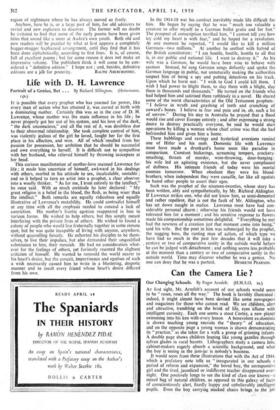A Voice from the 'Thirties
Collected Shorter Poems : 1930-1944. By W. H. Auden. (Faber. 1 ss.) A POET-CRITIC (a pygmy, but a symptomatic one) not long ago dismissed Auden as " already a period-piece." Now Auden is a poet of genius and a poet of considerable achievement ; but he has given his admirers many an anxious moment, and seems likely to go on doing so. There is plenty of room for criticism, both particular and general. But the counter-Audenary movement that set in with the 'forties, on whose behalf this pygmy was wielding his little blowpipe, based its attack largely on a facile misjudgement. It may be that the extremes of reaction are now diminishing. Certainly, since the New Romantic Movement got stuck in its own mud, a more balanced judgement of Auden's work among the younger generation of poets seems to be gaining ground.
I say " poets," and not " the poetry-reading public," because, apart from the fact that the two are rapidly becoming one and the same thing, it is poets, of course, who set the pace in, matters of taste ; and a cracking pace it is nowadays. It was inevitable, I suppose, that the poets who were ready to emerge at the end of the 'thirties should have reacted against their immediate pre- decessors ; and natural, too, that the basis of the reaction should have been not primarily aesthetic. The 'thirties were as clear-cut a decade, in public events and in mental climate, as you could have. (That is one reason why it was such an easy target.) It began with the slump and Auden's Poems ; it ended with the war and his removal to America. The poetry of the 'thirties was, on the whole, engaged. And Auden dominated it. With his barometric sensitivity to history he seemed to be deeply involved in the disastrous illusions of those years, and was indeed accused of fostering them.
It is a paradox that Auden's own words in September, 1939— "As the clever hopes expire Of a low, dishonest decade " —might have been used by his detractors as a summing-up of his own failure. The period-piece " sneer did hold a small grain of truth ; but it is not necessarily derogatory to say that there is a strong period-flavour now about some of his work. Certain lines and verses, re-read here, bring a positive wave of nostalgia to those who, so to speak, grew up with his poetry. Even amongst those there are a number who find it difficult not to think of his later progress as a sort of betrayal. The first impact was so exhilarating that they took him for a great deal more than a poet ; as something of an acknowledged legislator as well They demanded more from him than they should, and only listened to him carefully when he was being cheerful. Like a fairy-tale uncle he burst on the scene, to invigorate his nephews and nieces with advice and parable, sometimes cryptic but alwdys exciting, and help them throw oft the bondage of their elders. With Captain Ferguson, Kurt Groote, Loony Layard, Stephen, Rex, Christopher and other mythical characters, he led them to that frontier country, over scars where kestrels hover, through windless orchards, past dismantled washing- floors, driving the old gang before them. There they manoeuvred, spied out the land, sniped at the adversary's patrols, and waited for the signal to cross to the beloved republic. But the signal never came ; the weather grew chill and the frontier seemed an endless no-man's-land, and uncle—where was he ? No longer with his feet on the ground : a voice only, from the upper air, saying: "This is where I leave you ; you must make your own way over." But that Auden always had " the imagination of disaster," and frequently used it'for disturbing prophecy, should have been clear even then. " And the age ended and the last deliverer died "- that devastating comment on the facile " Marxist " solution— appeared in 1936. And earlier the uneven stanzas of " The Witnesses " had marched to their menacing conclusion in that
region of nightmare where he has always moved so freely.
Anyhow, here he is, or a large part of him, for old admirers to revisit and new explorers to discover. The former will no doubt be irritated to find that some of the early poems have been given titles that sound like a sneer at Auden's own youth. Both old and new readers will be puzzled by what at first appears a completely hugger-mugger haphazard arrangement, until they find that it has been done alphabetically, according to first lines. It is, of course, full of excellent poems ; but for some reason it does not make an impressive volume. The publishers- think it will come to be con- sidered a " definitive edition." I hope not ; and, besides, definitive







































 Previous page
Previous page